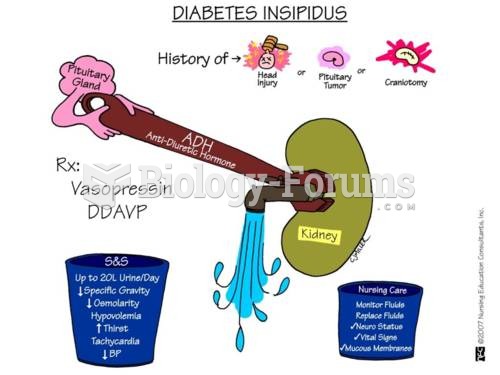Answer to Question 1
1,2,5
Rationale 1: Some of the medications used for type 2 diabetes cause weight gain.
Rationale 2: As type 2 diabetes progresses, the cells that produce insulin may fail, causing the need for insulin. Some medications especially designed to treat type 2 diabetes are injected.
Rationale 3: The activity of insulin receptors can be increased by physical exercise.
Rationale 4: Lifestyle changes can help the type 2 diabetic avoid complications.
Rationale 5: If type 2 diabetes is poorly managed, these complications can occur.
Global Rationale: Some of the medications used for type 2 diabetes cause weight gain. As type 2 diabetes progresses, the cells that produce insulin may fail, causing the need for insulin. Some medications especially designed to treat type 2 diabetes are injected. If type 2 diabetes is poorly managed, these complications can occur. The activity of insulin receptors can be increased by physical exercise. Lifestyle changes can help the type 2 diabetic avoid complications.
Answer to Question 2
3
Rationale 1:Clonidine (Kapvay) is incorrect because methylphenidate (Ritalin) is the most commonly prescribed medication for ADHD.
Rationale 2:Methamphetamine (Desoxyn) is incorrect because methylphenidate (Ritalin) is the most commonly prescribed medication for ADHD.
Rationale 3: Methylphenidate (Ritalin) is the most commonly prescribed medication for ADHD.
Rationale 4:Sertraline (Zoloft) is incorrect because methylphenidate (Ritalin) is the most commonly prescribed medication for ADHD.
Global Rationale: Methylphenidate (Ritalin) is the most commonly prescribed medication for ADHD. Clonidine (Kapvay), a non-CNS stimulant, is sometimes prescribed when patients are extremely aggressive, active, or have difficulty falling asleep. Methamphetamine (Desoxyn) is a CNS stimulant but is not the most commonly prescribed medication for ADHD. Sertraline (Zoloft) is a SSRI antidepressant and not the most commonly prescribed medication for ADHD.







